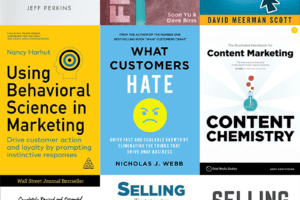Episode 26 of The Verblio Show
Mike King is one of the most well-respected technical SEOs on the planet. In his conversation with Steve, he shares his own journey from working at one of the world’s most famous agencies to running his own.
In addition to some actionable SEO tips for the more technically minded, Mike also talks about why he’s written letters from his future self, his views on networking, and how we as digital marketers can help to counter racism in AI.
Guest-at-a-Glance
Name: Mike King
What he does: Founder and Managing Director at iPullRank, a digital marketing agency serving small businesses and Fortune 500 companies including names like Beats, Johnson & Johnson, and Citi.
Find him on the web: iPullRank | LinkedIn | Twitter
Get smart: “One of the big issues here is that these machine learning models that we’re building and so on are gonna reflect reality, and reality is quite racist.”
Top Three Tips from This Episode
There is no SEO button
Mike tells about his experience working at an ad agency: “It was always like, ‘Hey, we’re about to launch this website can you press the SEO button.’ And I’m like, ‘Yo, that’s not how any of this works—you got to involve me way earlier than this.’”
SEO needs to be more than an afterthought, and there’s no single solution you can set and forget. “The consumers are going to continue to change, right?” Mike points out. “And so you have to try things, and then the things that you thought worked last week may not work next week, and you got to continually experiment.”
Execution > Strategy
If a client comes to you for SEO and you give them a plan but they don’t know what to do with it—you aren’t bringing them any value. “It’s one thing to say, ‘Here’s your strategy,’” Mike says, but “it’s another thing to be able to execute on that strategy.”
Part of what makes iPullRank such a successful agency is that Mike and his team make sure they have the technical skills needed—including coding, optimizing, etc.—to actually get results for their clients. “We are hyper focused on like, ‘All right, here’s the plan, let’s make this plan actually happen so we can meet your goals’—rather than just allowing you to check the box and say you did SEO.”
Think like a big agency
As Mike can attest, “There’s a language that’s being spoken in big agencies that’s not being spoken in small agencies.” During his time at major agencies like Razorfish, Mike learned a lot about working with big enterprise clients and the dynamics that shape the marketing environment.
Even if you’re a small agency, thinking about things like structure and deliverables from a larger point of view can be useful in positioning yourself in the market. And Mike has a no-nonsense take on one agency aspect in particular: “There’s a lot of small agency people that’ll tell you, ‘I don’t believe in account managers.’ Okay, well, if you want to work with big brands, you need to believe in account managers.”
Episode Highlights
Rethink what networking means
“People think about networking the wrong way. They think of it as if it’s like debits and credits, and you shouldn’t reach out to somebody too much. And that actually doesn’t make sense because the more that you engage with someone, the more of a rapport you have with them—the more that you can actually like help each other.”
Technical SEO Tip #1: Your keywords have keywords
“Let’s say, for instance, you want to rank for a keyword like basketball. Well, you can’t just use the word basketball on the page 40 times—that’s how people always thought you were supposed to approach it. You have to use the other keywords that are relevant to the topic ‘basketball.’ So if other pages have like LeBron James, NBA Finals, you know, other keywords like that on their page, Google also expects you to have those keywords on the page to be relevant to that topic.”
Technical SEO Tip #2: Keep your link equity intact
One of the most common SEO mistakes? “Updating the site and implementing redirects rather than updating the internal links to point to the final destination URL. And so what happens is, there’s that small loss in link equity every time you have that redirect throughout the site.”
Marketing = Connecting with Your Audience
“Even if you don’t care about SEO, if you see me at a broader conference, I’m still looking for ways to weave in things that are interesting to you and anyone else in the room, despite the fact that they’re not necessarily interested in what I do. …It’s just really understanding how to connect with people that you don’t have much of a relationship with by figuring out what it is that moves them and then orienting whatever you’re doing to them.”
Fighting racism requires better datasets
“One of the main things is that we don’t have inclusive datasets. So if you think about names, right, think about Siri. Imagine you have a name that’s not common and you ask Siri to say your name. Well, why does Siri not know how to say your name? Because the people working on Siri aren’t necessarily diverse enough to understand, ‘Oh, we got to account for these names that are not common.’”
Hold yourself accountable
“After every year—or even sooner, maybe quarterly—people should be like reflecting on what they’ve accomplished against their goals, and think like, ‘Okay. What didn’t I achieve? What do I wanna achieve next?’ …If you don’t really remain intentional you’ll look up and realize you’ve been running in place for years.”
A refreshingly optimistic take on the future of AI and machine-learning
“I don’t think that it’s gonna ever kill like editorial content in general. I just think that it’s really good for content that you shouldn’t be wasting the creativity ability of a person for. So, for instance, like glossary content or product descriptions, or financial reports—you don’t need a person to write those things. And my hope is that it frees up bandwidth for great writers to make more creative things and allows marketers and technical folks the ability to generate what they need to generate for those other use cases. That way, we just have better content for the stuff that people actually want to read.”
Top quotes:
Mike:
[12:01] “When I started my own agency, I knew a lot about what not to do.”
[29:50] “There’s an expectation—a statistical expectation—that Google has for any given keywords. The idea is that your keywords have keywords, basically.”
[36:47] “One of the big issues here is that these machine learning models that we’re building and so on are gonna reflect reality, and reality is quite racist.”
[37:31] “I just think that there’s a lot of opportunity for people to be way more thoughtful about what they’re creating, whether it’s algorithms, whether it’s content or what have you. And figuring out ways to, you know, just be better than where we came.”
Steve:
[27:16] “You still need humans to tell stories and you will always need them, even if [machine learning] just helps them do it faster.”
[38:05] “All of the glory in data analysis seems to be coming from running the perfect analysis, as opposed to running the perfect dataset.”



